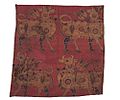8th century facts for kids
| Millennium: | 1st millennium |
|---|---|
| Centuries: | 7th century · 8th century · 9th century |
| Decades: | 700s 710s 720s 730s 740s 750s 760s 770s 780s 790s |
| Categories: | Births – Deaths Establishments – Disestablishments |
The 8th century was a period of big changes around the world. It lasted from the year 701 to the year 800. During this time, powerful empires grew, new ideas spread, and important events shaped the future of many civilizations. It was a time when different cultures connected and influenced each other, leading to new discoveries and ways of life.
Contents
A Look at the Years
The 8th century includes all the years from 701 to 800. Here are the decades that make up this exciting century:
- The 700s (701-709)
- The 710s (710-719)
- The 720s (720-729)
- The 730s (730-739)
- The 740s (740-749)
- The 750s (750-759)
- The 760s (760-769)
- The 770s (770-779)
- The 780s (780-789)
- The 790s (790-799)
- The year 800
Big Empires and New Ideas
This century saw the rise and fall of many important kingdoms and empires across different continents. People were exploring new lands, trading goods, and sharing knowledge.
The Islamic World Grows
The Islamic world continued to expand rapidly during the 8th century. The Umayyad Caliphate was a huge empire that stretched from Spain in the west all the way to Central Asia in the east. In 750, the Abbasid Caliphate took over from the Umayyads. The Abbasids moved their capital to Baghdad, which became a major center for learning, science, and art. Scholars in Baghdad translated ancient texts and made huge advancements in math, medicine, and astronomy.
China's Golden Age
In Asia, the Tang Dynasty in China was at its peak. This was a "golden age" for Chinese culture. Art, poetry, and technology flourished. The capital city, Chang'an (modern-day Xi'an), was one of the largest and most diverse cities in the world. It was a hub for trade, with people from many different countries living and working there. However, the Tang Dynasty also faced challenges, like the An Lushan Rebellion in the mid-700s, which caused a lot of trouble.
Europe's New Leaders
In Europe, the Franks became a very powerful group. Their leader, Charles Martel, was famous for his military skills. His grandson, Charlemagne, would later build a huge empire that covered much of Western Europe. This period is sometimes called the start of the Carolingian Empire. Christianity was also spreading and becoming more organized in Europe.
Important Events and Discoveries
Many events in the 8th century had a lasting impact on history. People were also making new discoveries and creating amazing works of art.
The Battle of Tours
One of the most famous events was the Battle of Tours in 732. This battle took place in what is now France. The Frankish forces, led by Charles Martel, fought against an invading army from the Umayyad Caliphate. The Franks won the battle, which many historians believe helped stop the further expansion of the Islamic empire into Western Europe.
New Inventions and Art
Across the world, people were inventing new things and creating beautiful art. In China, printing technology was developing, and new types of ceramics were being made. In the Islamic world, scholars were making progress in algebra and chemistry. In Japan, the Nara period saw the creation of large Buddhist temples and statues, like the Great Buddha at Tōdai-ji.
Related pages
Images for kids
-
A prisoner from Palenque in Toniná, from the Maya civilization in Central America.
-
An 8th-century Tang Dynasty Chinese clay figure of a man from Sogdia, possibly a priest.
See also
 In Spanish: Siglo VIII para niños
In Spanish: Siglo VIII para niños
 | Aaron Henry |
 | T. R. M. Howard |
 | Jesse Jackson |





